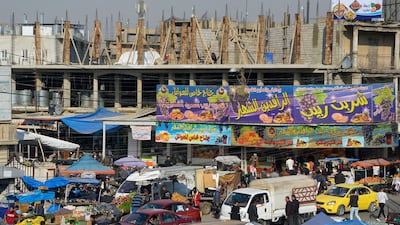The United Nations humanitarian co-ordinator in Iraq has warned that military and civilian bureaucracy is stifling aid operations from reaching the most vulnerable people in the country.
Marta Ruedas told The National she is extremely concerned that a recent suspension in granting access letters to humanitarian agencies in Iraq could severely affect those most in need.
Aid deliveries that need “to cross through security checkpoints—such as those involved in the delivery of food, medicine or other vital supplies—their current operations are effectively at a standstill,” Ms Ruedas said.
Permission letters allowing aid workers to pass through checkpoints without interference from local governments or militias were, until recently, issued every 30 days.
One central government authority in Iraq, the Joint Co-ordination and Monitoring Centre, was tasked with granting access letters, which were accepted only through a vetting process that was adhered to by the UN and other humanitarian agencies in Iraq.
But in 2019 the system appeared to “fragment,” said Ms Ruedas.
“Military actors as well as civil authorities increasingly began demanding additional local approvals or supplementary permissions in order to pass through checkpoints,” Ms Ruedas said.
“This resulted in confusion for humanitarian actors, who were and are unsure of whom to address if and when problems arise,” she said.
Since last November humanitarian deliveries throughout the country have dramatically slowed.
A survey conducted by OCHA found 90 per cent of aid agencies surveyed had been impacted by the lack of access letters being issued, and 2460 missions were cancelled or denied access to the people they were trying to help.
The governorate most affected is Nineveh, after ISIS swept through and seized large areas, resulting in the displacement of thousands of families.
For example, NGOs in Nineveh cannot move to all the locations they need to visit without obtaining a separate letter from the Nineveh Operations Command which restricts the movement of the UN, personnel and humanitarian aid.
For several months the humanitarian community raised its concerns with Iraqi authorities but no progress has yet been made.
The UN agency said it was left with no other choice but to raise the issue publicly.
“Our operations are at risk,” said Ms Ruedas said on January 16. “Without predictable, continual access authorisation, humanitarian aid is in danger of rotting in warehouses, putting lives in jeopardy and wasting badly-needed donor funds.”
The UN official said that federal authorities recently handed responsibility for providing authorization letters “to a different entity, who established a new procedure for access permission.”
But there are “uncertainty as to whether to adhere to the old or new system, and who the appropriate counterparts are, has also contributed to the current impasse,” she said.
The UN has called on the government to provide them with some clarity on the procedure.
In 2019 and 2020, humanitarian operations in the country estimated 1.75 million people are in acute need of humanitarian assistance.
This figure includes residents of displacement camps and returnees living in areas of destruction that indicate a lack of livelihoods, services, social cohesion and security, she said.
More than 100 agencies carried out operations in over 1,300 locations throughout the country in 2019.
Without permission from the government “humanitarians are not able to cross through security checkpoints in Iraq, limiting our access to people in need, and putting lives as risk.”
But not all operations in Iraq are dependent on access letters, allowing some work to continue.
Those that are not are “currently serving and will continue to serve vulnerable people in Iraq as mandated.”



